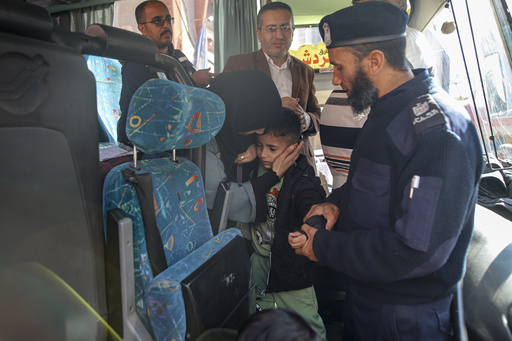Rafah Crossing, Egypt – On Saturday, a cohort of 50 ailing and injured Palestinian children commenced their journey into Egypt for medical care through the Rafah crossing, marking the first time the border has opened since its capture by Israel nearly nine months ago.
The reopening of Rafah is seen as a crucial development that enhances the ceasefire agreement reached by Israel and Hamas earlier this month. This step followed Hamas’s release of the last surviving female hostages held in Gaza, prompting Israel to allow the crossing to open.
Egypt’s Al-Qahera television broadcast scenes of Palestinian Red Cross ambulances arriving at the crossing. Some children, transported on gurneys, were swiftly moved to ambulances on the Egyptian side for immediate care in hospitals located in el-Arish and other nearby areas. A particularly poignant moment captured a young girl, whose foot had been amputated, as she was being loaded into an ambulance in Egypt.
According to Gaza’s Health Ministry, approximately 60 family members accompanied the children during this critical transfer. These children represent the beginning of what is anticipated to be a series of regular evacuations designed to facilitate medical treatment for Palestinians needing care abroad. Over the past year, the health infrastructure in Gaza has been severely compromised by Israel’s military actions in response to a Hamas-led attack on southern Israel on October 7, 2023, leaving many hospitals non-operational while over 110,000 Palestinians sustained injuries due to airstrikes and ground offensives, as reported by the Palestinian Health Ministry.
The remaining healthcare facilities have been rendered incapable of performing numerous necessary procedures or specialized surgeries. Mohammed Zaqout, who directs hospitals within Gaza’s Health Ministry, mentioned that more than 6,000 patients are prepared for evacuation, with over 12,000 in urgent need of medical attention. He expressed concern that the limited number of evacuations allowed would not meet the overwhelming demand, stating, “We hope the number will increase.”
Rafah serves as Gaza’s sole crossing that does not lead into Israel. Following a military offensive in early May, Israeli forces closed this route. Egypt subsequently halted access from its side in response. Prior to the outbreak of the Gaza conflict, the Rafah crossing had always been an essential outlet for residents in the territory, where a 15-year Israeli-Egyptian blockade aimed at restricting Hamas has devastated health services and led to widespread poverty. Palestinians frequently sought permissions to leave Gaza for life-saving medical treatments not available within the territory, including cancer therapies.
Reopening the crossing required intricate diplomatic efforts to resolve security concerns among Israeli, Egyptian, and Palestinian officials. Hamas has managed the border since 2007 when it assumed control of Gaza from the rival Palestinian Authority (PA) following a legislative victory in 2006.
Despite the reopening, Israeli forces continue to maintain a presence at the Rafah crossing and in the surrounding Philadelphia Corridor along the border. Israel has consistently rejected the return of Hamas to border administration, accusing it of using tunnels for weapon smuggling; however, Egypt claims it has destroyed those tunnels and halted any smuggling activity years prior. Additionally, Israel has denied the PA an official role in managing the crossing.
Instead, the crossing will function with Palestinian staff from Gaza who were previously employed as border officers under the PA, but will not be permitted to display any official PA emblems. A European diplomat, who opted to remain nameless, noted that Israel has vetted these officers to ensure no connections with Hamas. European Union monitors will also be present at the site, reflecting their pre-2007 role.
As for ongoing negotiations regarding a second phase of the agreement—which seeks a comprehensive ceasefire, a complete Israeli withdrawal from Gaza, and the release of any remaining hostages—discussions are set to commence on Monday. Israel has been resistant to the idea of the PA managing post-conflict Gaza.




